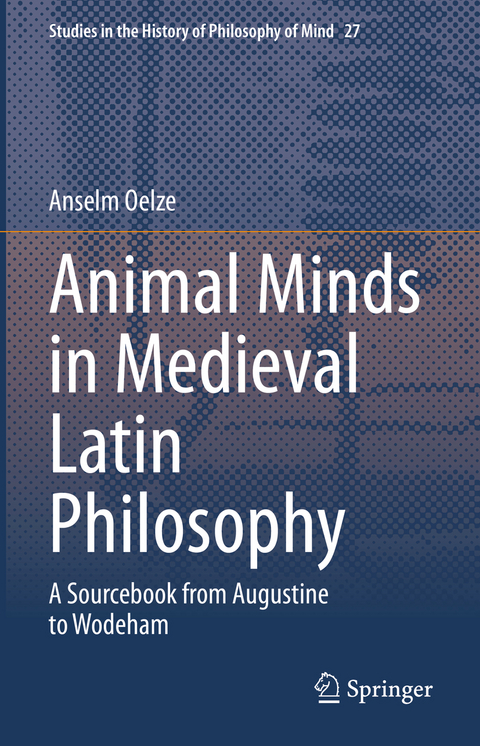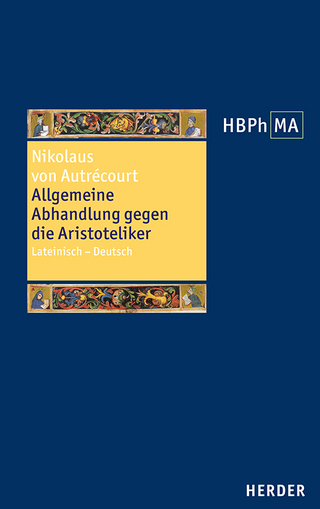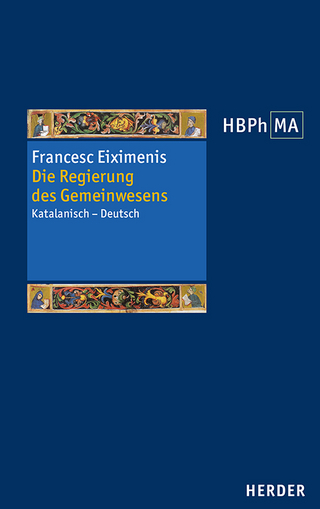
Animal Minds in Medieval Latin Philosophy
Springer International Publishing (Verlag)
978-3-030-67011-5 (ISBN)
This sourcebook explores how the Middle Ages dealt with questions related to the mental life of creatures great and small. It makes accessible a wide range of key Latin texts from the fourth to the fourteenth century in fresh English translations. Specialists and non-specialists alike will find many surprising insights in this comprehensive collection of sources on the medieval philosophy of animal minds.
The book's structure follows the distinction between the different aspects of the mental. The author has organized the material in three main parts: cognition, emotions, and volition. Each part contains translations of texts by different medieval thinkers. The philosophers chosen include well-known figures like Augustine, Albert the Great, and Thomas Aquinas. The collection also profiles the work of less studied thinkers like John Blund, (Pseudo-)Peter of Spain, and Peter of Abano. In addition, among those featured are several translated here into English for the first time.
Each text comes with a short introduction to the philosopher, the context, and the main arguments of the text plus a section with bibliographical information and recommendations for further reading. A general introduction to the entire volume presents the basic concepts and questions of the philosophy of animal minds and explains how the medieval discussion relates to the contemporary debate. This sourcebook is valuable for anyone interested in the history of philosophy, especially medieval philosophy of mind. It will also appeal to scholars and students from other fields, such as psychology, theology, and cultural studies.
lt;p>
Anselm Oelze (PhD Humboldt University of Berlin, 2017) worked as postdoctoral researcher at the University of Helsinki and as teaching fellow in philosophy at the LMU Munich. He is author of the book Animal Rationality: Later Medieval Theories 1250-1350 (Brill, 2018) and of articles on animal cognition and animal ethics in the Middle Ages.
Introduction: Animal Minds In Medieval and Modern Philosophy.- Part I - Cognition.- Chapter 1. Perception, Knowledge, and Reason (Augustine, De quantitate animae 25-28).- Chapter 2. Souls and Discrimination (Adelard of Bath, Quaestiones naturales 13-14).- Chapter 3. Estimation and Concept Formation (John Blund, Tractatus de anima 19).- Chapter 4. (a). Memory, Learning, and Prudence (Albert the Great, Metaphysica I.1.6).- (b). Reasoning, Learning, and Language (Albert the Great, De animalibus XXI.1.2-4). Chapter 5. Universal Cognition (Pseudo-Peter of Spain, Commentum super libros De animalibus VIII).- Chapter 6. (a). Reasoning and Thinking (Roger Bacon, Perspectiva II.3.9).- (b). Goal-Directed Behaviour (Roger Bacon, Questiones super libros IV Physicorum II).- Chapter 7. Inner Senses (Thomas Aquinas, Summa theologiae I.78.4).- Chapter 8. Prudence (John Duns Scotus, Quaestiones super libros Metaphysicorum Aristotelis I.3).- Chapter 9. Judging and Erring (Gregory of Rimini, Lectura super I Sententiarum III.1 vs.Adam Wodeham, Lectura secunda in I Sententiarum, prol. 4.8).- Part II. Emotion.- Chapter 10. Friendship, Enmity, and Fear (Albert the Great, Quaestiones super De animalibus VIII.1-3).- Chapter 11. (a). Lust and Anger (Thomas Aquinas, Summa theologiae I.81.2-3).- (b). Enjoyment (Thomas Aquinas, Summa theologiae I-II.11.2).- (c). Hope (Thomas Aquinas, Summa theologiae I-II.40.3).- Chapter 12. Happiness and Fun (Peter of Abano, Expositio problematum Aristotelis 28.7).- Part III. Volition.- Chapter 13. Judging and Free Choice (Albert the Great, De homine I).- Chapter 14. Free Will (Bonaventure, Commentarius in secundum librum Sententiarum 25.1.1).- Chapter 15. Instinct and Deliberation (Roger Bacon, Communia naturalium I.2.4.1).- Chapter 16. (a). Free Choice (Thomas Aquinas, Quaestiones disputatae de veritate 24.2).- (b). Choosing and Acting (Thomas Aquinas, Summa theologiae I-II.13.1-2).
| Erscheinungsdatum | 20.04.2021 |
|---|---|
| Reihe/Serie | Studies in the History of Philosophy of Mind |
| Zusatzinfo | IX, 212 p. 1 illus. |
| Verlagsort | Cham |
| Sprache | englisch |
| Maße | 155 x 235 mm |
| Gewicht | 506 g |
| Themenwelt | Geisteswissenschaften ► Philosophie ► Philosophie des Mittelalters |
| Schlagworte | Animal Cognition in Medieval Philosophy • animal emotions • Animal Minds in Medieval Philosophy • Animal Minds in the Middle Ages • Animal Rationality • Estimation and Concept Formation in Animals • Friendship, Enmity, and Fear in Animals • Goal-Directed Behaviour in Animals • Instinct and Deliberation in Animals • Judging and Free Choice in Animals • Lust and Anger in Animals • Memory, Learning, and Prudence in Animals • Perception, Knowledge, and Reason in Animals • Reasoning, Learning, and Language in Animals • Universal Cognition among animals |
| ISBN-10 | 3-030-67011-2 / 3030670112 |
| ISBN-13 | 978-3-030-67011-5 / 9783030670115 |
| Zustand | Neuware |
| Haben Sie eine Frage zum Produkt? |
aus dem Bereich


